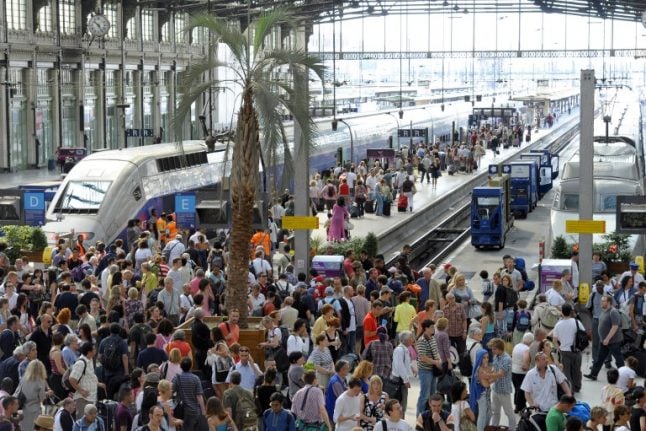The three month long rolling rail worker strikes in France were due to come to an end on Thursday, much to the relief of passengers.
But two out of the four trade unions who have led the strikes since early April have decided to continue the movement, even though the cause of their protests – – President Emmanuel Macron's rail reforms – have been voted through parliament and signed into law.
Not only are the more hardline CGT and Sud Rail continuing the strikes throughout the summer but they will target the first weekend of the school holidays Friday July 6th and 7th when many French families will head away on holiday.
Fabien Dumas, the Federal Secretary of Sud Rail told The Local that holidaymakers should not blame them, but Macron and his government for passing the “Thatcherite reforms”.
Rail unions, known as cheminots in France have been particularly angry over the government's plan to end the special status for new recruits, which included a job a for life, automatic pay rises and early retirement.
They also opposed plans to turn the SNCF into a joint-stock company, seeing it as a first step toward privatisation which they believe would harm public services.
“This law was bad reform to begin before it was voted through parliament and it's still a bad law after the vote,” said Dumas. “We protested before to prevent the law coming into force, now we are protesting to call for the law to be abolished.”
“The aim of the reform is to improve the quality of the service for users, which we agree with, but the law begins by saying the special status of rail workers is bad and that we must open up the rail network to competition.
“We say that opening up the network to competition will not improve services, neither will ending the special status of the cheminots.
Dumas says that the reform is not good for rail users or rail workers.
There has been some suggestion that the two unions were continuing the strike in order to flex their muscles ahead of “professional elections” in November, when workers vote for the union they want to represent them.

In general the most powerful unions among the workers will have more chance of having their demands heard by bosses.
But Dumas dismisses this suggestion and says Sud Rail's only objective is the abolition of the reform and they say the only way they have a chance is by striking.
“The logic is simple. Workers have never achieved anything without going on strike. All the rights we have won over time have been by striking. Bosses have never given away anything for free,” said Dumas.
The union leader was unapologetic about striking on the first weekend of the summer holidays.
“The thinking behind our way of striking is simply to have the biggest impact possible,” he said.
“We don't aim to anger the public but to have an impact on the economy and the tourist industry.”
It is still not certain how much impact the strikes on July 6th and 7th will have on train services.
During the last three months the participation rate of rail workers in the rolling strikes has steadily decreased to the point when on the final day of the strike only 10 percent of cheminots joined the walk-out and only 32 percent of train drivers.
While most TGV and international services ran as normal there was still disruption and cancellations on TER and Intercité mainline services.
Dumas believes that even though two unions have decided not to continue the strike it doesn't mean there will be less disruption to train services on July 6th and 7th.
“The CGT and Sud Rail together represent 51 percent of rail workers and can still mobilise more workers unlike the CFDT union which represents managers.
“The number of strikers won't change in fact there could even be a bounce in mobilisation among rail workers.”
And the Sud Rail representative insists they don't just have their own interests at heart and blames Macron for taking the path of former Conservative British Prime Minister Margaret Thatcher.
“The same thing is happening everywhere, in hospitals, in schools, in retirement homes, in the energy sector. Macron is passing all these Thatcherite reforms. None of this is the fault of unions or rail workers or nurses, but the government.
“Next time maybe the public need to think about that when they vote.”
The government argues that the SNCF — a bastion of union power — needs to cut costs and improve flexibility before the EU passenger rail market is
opened up to competition from December 2019.
The company has some 47 billion euros ($55 billion) in legacy debt, much of it stemming from the rollout of sleek high-speed TGV trains, long a source of national pride.



 Please whitelist us to continue reading.
Please whitelist us to continue reading.
Member comments